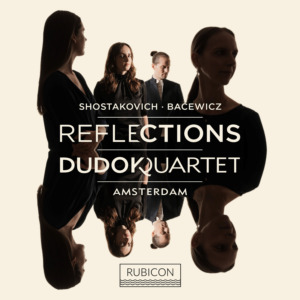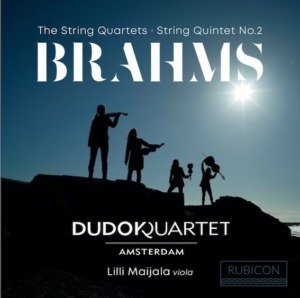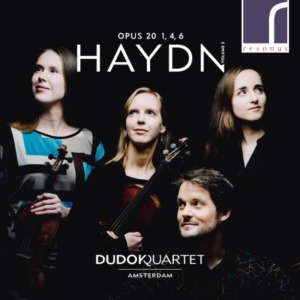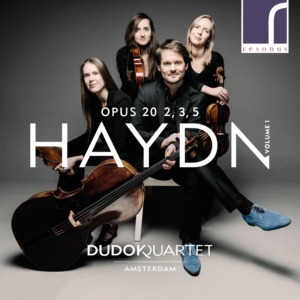
Dudok Quartet Reflections
Reflections
Bacewicz and Shostakovich
Rubicon Classics RCD1099
This recording confirms the strong impression of the previous Brahms album. The Dudok Quartet really has something to say – and does so with an energy and dedication that is so gripping, even on a recording, that you feel as if you were sitting right in the middle of it.
Fono Forum, April 2023
The Dudoks deliver a rhythmically dynamic and wonderfully nuanced account of the Bacewicz. Their Shostakovich is also impressive, projecting tremendous power, ferocity and forward momentum in the outer movements and poignancy in the central Andante… their brilliant and witty arrangements of a selection of Shostakovich’s 24 Preludes deserve special praise for making such intrinsically pianistic music sound so idiomatic in this guise.
Erik Levi, BBC Music Magazine, February 2023
Shostakovich’s Fifth Quartet is, of course, a unified masterpiece, and the Dudoks clarify the thematic connections and returns in the most perfectly balanced of interpretations – bittersweet, fierce, singing and jabbing … the performance is everything, and simply perfect. The arrangements of seven of the earlier set of piano preludes by Faber and first violinist Judith van Driel – who makes them sound as if they were conceived for her instrument in the melody-lines in the first place – are also an ideal bridge, and the natural sound allows the textures to stay equal throughout. A winner.
David Nice, The Arts Desk, 14 January 2023
It is their versatile expressiveness that makes this such an appealing performance ****
De Standaard, 30 November 2022
Fevered and energetic, [the Shostakovich String Quartet’s ] qualities are incisively brought out by the Dudoks. Bacewicz’s three-movement Quartet No 4, written for the Polish Composers’ Union, reflects her own string-playing fluency – she was a violinist – as well as her fascination with folk songs and rhythms. Contrasts and echoes between the two are winningly explored by this fine quartet.
Fiona Maddocks, The Observer, 27 November 2022
There’s an energy and life that flows through these performances.
Andrew MacGregor, BBC Radio 3 Record Review, 26 November 2022
Fantastic quartet playing *****
Dagblad van het Noorden, 25 November 2022
 Brahms String Quartets 1-3 & Second String Quintet * on Rubicon Classics
Brahms String Quartets 1-3 & Second String Quintet * on Rubicon Classics
* Lilli Maijala viola
Assisted by a vivid and immediate recording, these performances are searching and artistically satisfying, combining freshness, polish, warmth and spontaneity with well-integrated detail, excellent balance and blend and immaculate ensemble.
Robin Stowell, The Strad, January 2022
… beautifully poised performances recorded with gut strings. … Rubato is sensitive, and portamento discreet; the overwhelming impression is one of warmth, this Brahms smilier and cuddlier than some performances suggest. Quartet No. 1’s hushed opening is superbly done, and the rhetorical chords which follow it pose questions rather than bludgeoning us. The interplay between the two violins is sweetly handled. I like the finale’s driving energy, the C minor close exhilarating rather than depressing. No. 2, composed at the same time, follows a similar template, these players at home in the slow movement’s ear-worm of a main theme as they are in the minuet’s skittish trio… Violist Lilli Maijala joins the Dudoks in a performance [of the Second String Quintet] that’s comparable to a slice of rich fruit cake, one where the flavours aren’t subsumed by excess starch or sugar. It’s glorious, especially in the genial finale.
Graham Rickson, The Arts Desk, 13 November 2021
First violinist Judith van Driel and cellist David Faber of the Dudok Quartet see an ‘unlimited musical labyrinth’ in Johannes Brahms’s chamber music. And that is exactly the way in which they interpret his three string quartets and the Second String Quintet on their new double album: endlessly wandering. They are not looking for the shortest route to the exit or the heart of the maze, but they also explore the corridors that lead to dead ends, because they also contribute – perhaps precisely – to what makes the labyrinth a labyrinth.
The writer Hemingway once argued that a novel is an iceberg of which only one eighth rises above the water, that is, forms the book. Something similar is happening with Brahms: his first two string quartets, for example, stem from twenty earlier versions that disappeared in the fireplace. And that makes the Dudok Quartet tangible: this is music without dead letters, always in motion, every time new.
Joost Galema, NRC Handelsblad, 04 November 2021
… numerous tempo fluctuations are often momentary, as in the little linking passages in the first movement of the A minor quartet, beautifully played by the quartet’s leader Judith van Driel … In all these recordings are a marvel, revealing the intricate detail of these pieces with lovely clarity.
Ivan Hewett, Daily Telegraph, 4 November 2021
Their new album simply features Brahms, although it is Brahms with a bite…
It’s as if Brahms is thawing. Suddenly he is a composer of mild mixed sounds. Even at its fiercest – the closing of the third String Quartet – the music remains transparent.
Guido van Oorschot , De Volkskrant, 28 October 2021
With the first notes of String Quartet No 1 in C minor Op 51, the lyrical sounds surge. From the passionate, rousing opening through a dreamy romance and the beautifully subdued poetry of the third movement to the graceful finale, the Dudok Quartet maintains the tension with playing that sparkles with musical pleasure over the entire length of the piece. This approach continues in the electrifying dialogues of string quartet No 2 in A minor Op 51. In string quartet No 3 in B flat Op 67 the bows sparkle in expressively picturesque music full of changing timbres and with great dynamic contrasts. …a double album with inspired interplay and technical virtuosity condensed into more than two hours of lyrical music as a warm embrace. What more do you want?
C Cornell Evers, Reporters Online, 26 October 2021
Haydn Op 20 String Quartets Nos 1, 4 & 6 on Resonus Classics

RES10262 Haydn Op 20 Quartets Vol 2
CD Cover design: Daan van der Horst with photograph by Marco Borggreve
The Dudoks, now recognised as one of the most stylish, open-minded and adventurous among younger ensembles, bring heady energy to all three quartets included here – Nos 1, 4 and 6
Fiona Maddocks, The Observer, 14 June 2020
This follow-up [to Vol 1] confirms the young Dutch ensemble’s Haydn credentials in performances that combine technical polish (immaculate timing, balance and ensemble), boundless vitality and a lively response to the specific character of each movement… I was exhilarated by the mingled virtuosity, finesse and coursing energy of these performances.
Richard Wigmore, Gramophone, June 2020
…the Dudok open the Allegro moderato of the E-flat Quartet sprightly [sic], bringing a transparency to the textures. I’ve found this performance particularly successful, communicative and commanding. The D major Quartet, even more than the previous performances of Op. 20, reveals an exceptional level of unity between the players, and the stylish playing makes them a pleasure to listen to. The minuet and trio have the occasional, stylish embellishment, creating an air of spontaneity. The Presto scherzando brings vivacity in this mostly serious reading. …Overall, the Dudok give performances that are essential listening for any chamber music or Haydn fan, with elements of both period sound and modern performance practice.
Leighton Jones, The Classic Review,11 May 2020

RES10248 Haydn Op 20 Quartets Vol 1
CD Cover design: Daan van der Horst with photograph by Marco Borggreve
Haydn Op 20 Quartets Volume 1: Nos 2, 3 & 5
on Resonus Classics
At once the Dudok impresses with its responsiveness to gesture, not playing games with tempo but allowing the pulse to yield gently as the four-way conversation develops… This is chamber music for friends, not concert music for an audience … Throughout the disc the listener is drawn in closer as the stories become more personal… All is played with true assurance and understanding; and this ensemble’s care for structure is worthy of its architect namesake.
David Threasher, The Strad, January 2020
One of the lasting pleasures of this recording from the Dudok Quartet of Amsterdam is how well the musical argument is spread between the players… These are glorious performances, beautifully recorded and produced. Four rational people, conversing with eloquence, intelligence and absolutely no shouting. What could be better?
Graham Rickson, The Arts Desk, 2 November 2019
…exemplary recordings of the string quartets opus 20: music with a deceptive and unparalleled simplicity and nobility and above all an enigmatic, immeasurable depth and lightness, that is, for the attentive listener, forever surprising and uplifting.
God, how beautiful this is.
Erik Voermans, Het Parool, 21 October 2019
We have seen before that these players can take on just about anything… The Dudok Quartet has combined repertoire from different style periods over the past few years (Mozart with Ligeti, Mendelssohn with Weinberg), resulting in a series of highly successful albums.
The players show once again the elegance in their interaction. They delicately topple over each other in the faster movements. The slow movements sound subdued but never collapse.
The fugal finales of the second and third quartets are subtle in their choice of tempo and played with crystal clear sound. Hopefully this album is the first in a long series of Haydn recordings.
Maartje Stokkers, De Volkskrant, 11 October 2019
Always alert to Haydn’s myriad caprices, [the Dudoks] introduce some perfectly placed, sinuous phrasing in the third movement of No 3 in G minor, and real verve and colour in its brilliant allegretto. There is an elegant poise to the minuet and trio of No 5 in F minor, then aching dignity in the adagio. Quartets 2 and 5 in the Op 20 set end with a fugue, played sotto voce and at breakneck speed, just one of Haydn’s playful innovations so brilliantly captured here by the Dudoks and beautifully recorded.